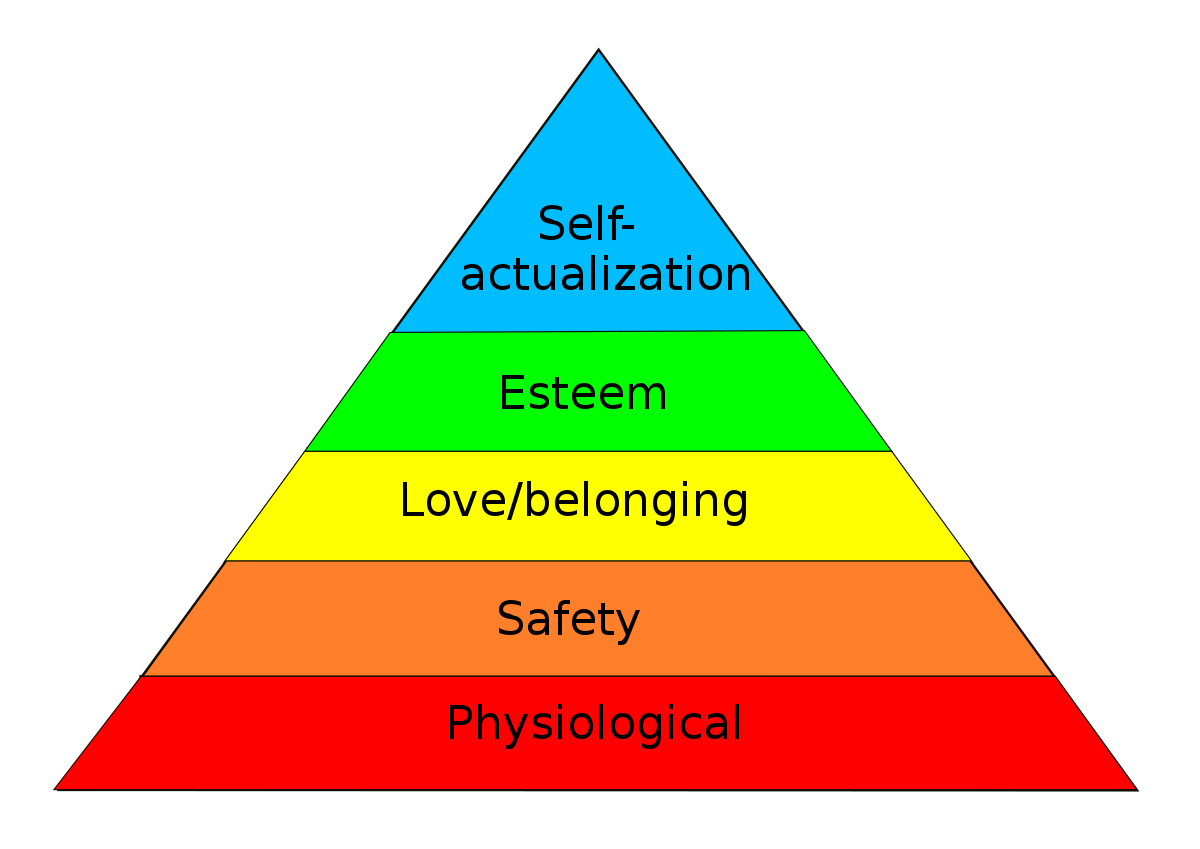In last week’s ballet review, I found an opportunity to bring up Maslow’s hierarchy of needs. When I was thinking about what to post this week, I came across a draft about Maslow’s hierarchy that I had started a while ago. Seems like the perfect time to dive in, wouldn’t you agree?
Abraham Maslow was a 20th-century American psychologist. He was one of the fathers of the humanistic psychology paradigm, which centers the concept of self. The individual perceives the world according to their own experiences and this shapes their personality and behavior. For Maslow, foundational needs must be satisfied before an individual can seek to fulfill higher levels of existence.

The bottom tier of Maslow’s hierarchy is physiological needs – food and shelter, followed by safety, then love and belonging (personal relationships, sense of community, and affiliation with both formal and informal social groups). Esteem, the fourth level in the hierarchy has to do with self-respect and self-confidence as well as the desire to be valued and recognized by others.
The hierarchy is not rigid, one does not need to be completely fulfilled one tier in order to move on to the next level. It is also not absolute – someone may be at the point at which they are striving to fulfill their self-actualization needs and may experience a deficiency in their love/belonging or even physiological needs.
The top tier if Maslow’s hierarchy is self-actualization. This has to do with striving to achieve our potential and satisfying out creative goals. For Maslow, self-actualization is a state in which one is able to transcend ego (this reminds me of our chakra series). It is an interesting paradox.
Scott Barry Kaufman, a professor at Columbia University has revisited and been researching Maslow’s concept of self-actualization. On his “about” page, I noticed that he refers to his “past life” which made me smile, because I have taken to speaking about the years that I was dancing as my past life.
You can take Dr. Kaufman’s Characteristics of Self-Actualization test (in case you don’t like my hyperlinks, here is the url: https://www.scottbarrykaufman.com/characteristics-of-self-actualization-scale/). I mean, who doesn’t love a good internet personality test? This one is free and anonymous; you don’t have to put in your email address to get the results or anything. I really liked what the questions made me think about.
For Dr. Kaufman, the characteristics of self-actualization are:
- Continued freshness of appreciation
- Acceptance
- Authenticity
- Equanimity
- Purpose
- Efficient perception of reality
- Humanitarianism
- Peak experiences
- Good moral intuition
- Creative spirit
You don’t have to have a high score on most (or even many) of these characteristics to be self-actualized. Different things are more or less important to different people, I can think of lots of people (or maybe it’s just me) who aren’t even interested in having an efficient perception of reality. But someone who scores low on all of these characteristics may be functioning in the little hunger zone, rather than taking advantage of an opportunity to address their big hunger.
Anyway, I thought this was something fun to think about on a Monday.

That was fun! I do love a good internet quiz. A very nice start to Monday!
Health & Wellness Monday, what an awesome way to begin my week! Dropping information and reminding me about Maslow’s Self Actualization hierarchy and transcending the ego, real cool food for my mental well being. Thank you for your innovative and generous topics
Health & Wellness Monday, what an awesome way to begin my week! Dropping information and reminding me about Maslow’s Self Actualization hierarchy and transcending the ego, real cool food for my mental well being. Thank you for your innovative and generous topics